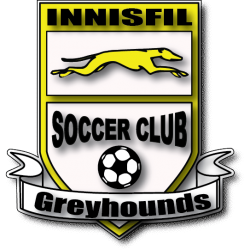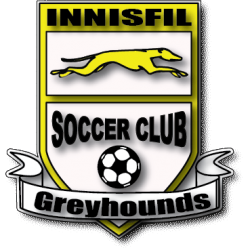PLAYER’S CODE OF CONDUCT
The following code of conduct is now incorporated into the rules and regulations of the Innisfil Greyhounds Soccer Club, and each member is hereby bound by its principles and obligations upon registration and signature attached.
Play
- Players are expected to play within the laws of the game.
- Understand the laws of the game. A player attempting to foul an opponent is liable to a caution, whether contact is made or not. Offside rulings are subject to game situations. Player advantage may delay a ruling of an obvious infraction.
- It is understood that diving and embellishing injuries be discouraged by the team as a whole. The referee will have observed an instantaneous, and therefore suspect, injury recovery. This type of behavior increases the risk of a non-call following a genuine infraction. This non-call may result in verbal dissent of the game official. The negative effect of this type of behavior usually outweighs the results on the scoreboard or on team morale.
- Accept your coach’s player changes and line up decisions with the team’s best interests in mind. Coaching decisions should be judged with discretion, and not affect the morale of the team.
- Players are expected to apologize to an opponent and his teammates following an infraction of the rules.
- Players are expected to accept defeat and victory with dignity and class, and to treat others as you would like to be treated.
Cautions/Suspensions
- The Club shall collect the league fine of Ten Dollars from any Innisfil player that is given a yellow card during any sanctioned league game, which will be payable to the league.
- The Club shall collect the league fine of Thirty Dollars from any Innisfil player that is given a red card during any sanctioned league game, which will be payable to the league.
- A red card awarded for the accumulation of two yellow cards will constitute a total fine of Thirty Dollars.
- A $150 fine will apply for any verbal or physical assault on a referee or other game official.
- Player infractions and the corresponding fine may be appealed, but will need to follow the procedures outlined by the league. Any appeal fees will need to be paid by the player.
- Should the team rep. wish to appeal a fine, the Club Executive will hear him, and his player witness’ testimony.
- Team reps. will be provided with a list of acceptable appeal policies. Infractions that contravene this code of conduct will not be accepted on appeal.
- The fine will need to be paid in full to the Club before the infracting player can participate in the next eligible game. This ruling shall be strictly enforced.
Dissent
- It is the responsibility of each individual player to control his behavior, on the field, as well as on the sidelines. We have seen an increase in the numbers of spectators and children at our games/practices and we need to be mindful of the example we set.
- Players are expected to control retaliations to a foul. It is the responsibility of each and every player to advise an infracting player of his conduct.
- The Club will not accept an Innisfil player’s berating of an opposing player, coach, or game official. Grievances will be dealt with using the league approved appeal process.
- Barring this process, any game official’s decision will be deemed final, and accepted in a mature manner to allow the game to conclude without incident.
Game Attendance
- Attendance at scheduled games is imperative. You have agreed to play a team sport that requires 21+ other competitors for a viable game. Out of respect to the time and expense incurred by those other 21+ individuals, organizers, and officials, every effort should be made to attend. The thought that “I’m just one player, and it’s just one game” is faulty, in that it is never just one player with this thought. If you are aware that you cannot make the scheduled game, a team representative needs to be informed immediately. The domino effect of teams playing short-handed is the collapse of the team. A reliable core of players will insure the minimum size of the roster and therefore the maximum amount of playing time.
- Players are expected to arrive in time to allow game sheets to be prepared, line ups assigned, and tactics to be discussed in an orderly fashion.
- It is understood that a player missing three games, without proper, advance, notification, will be asked to return their uniform, and be relegated to a reserve call-up squad.
Team Practices
- Attendance at scheduled practices is vital. It is clinically proven that a person over 35 years of age, leading a substantially non-active lifestyle, risks serious health dangers with the expectations of a high caliber activity on a once-a-week basis. It is also unrealistic to expect the team to perform with confidence or cohesion without investing in the drills and scrimmages required in a sport with this many participants.
- The Club expects each member to take advantage of the time and effort required to organize and maintain these practices. If a scheduling conflict prohibits your participation, the Club needs to be informed, and hopefully alternative arrangements can be made.
Club Objectives
That each member understand that this Club was formed to further the enjoyment of the game of soccer. For many of us, this provides an opportunity to escape the demands of a stressful litany of responsibilities, while testing any remaining desires to compete. The Club and your team’s ultimate aim should be to these ends.
Coaches and Club Executive Code Of Conduct
Coaches and Executives of Innisfil Greyhounds Soccer Club Teams are required to abide by the code of conduct set out below.
- They must respect the rights, dignity and worth of each and every person and treat each equally within the context of the sport.
- They must place the well-being and safety of each player above all other considerations, including the development of performance.
- They must develop an appropriate working relationship with each player and peer Coach based on mutual trust and respect.
- They must encourage and guide players to accept responsibility for their own behavior and performance.
- They must always promote the positive aspects of the sport (e.g., fair play) and never condone violations of the Laws of the Game, behavior contrary to the spirit of the Laws of the Game or relevant rules and regulations or the use of prohibited substances or techniques.
- They must consistently display high standards of behavior and appearance.
- Impartial, competent officials are essential for the success of any competition. Coaches must not criticize officials publicly or privately and must follow institutional, conference or organizational rules dealing with comments on officiating
- They must not make derogatory or misleading comments to the media about officials, opposing teams and coaches, other Innisfil teams, players or coaches, spectators, parents or other institutions.
- They must perform their duties on the basis of careful preparation, ensuring their instruction is current and accurate. Coaches must continually seek new opportunities for professional development and education.
- They must remain current on health, safety and training developments relevant to the sport of soccer.
- They must not contact, borrow, train, coach or otherwise entice a player not registered on their team without the express permission of that players head coach or in his absence, assistant or manager. This applies to Innisfil teams and other teams outside Innisfil.
- Their behavior and values must bring credit to his/her program, Innisfil Soccer club and the sport of soccer.


